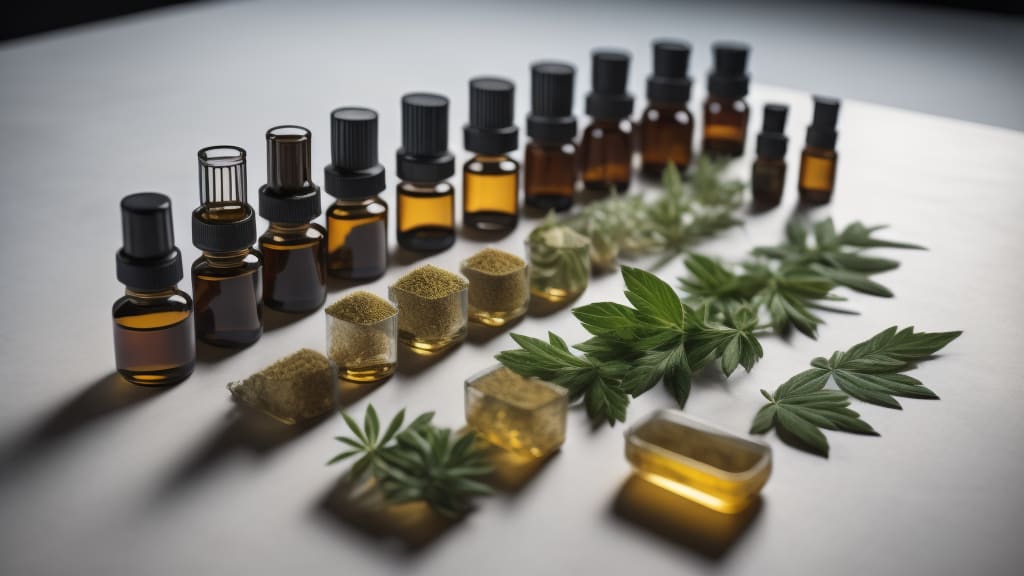The Healing Properties of CBD
Separating Fact from Fiction

CBD, short for cannabidiol, has gained significant attention in recent years for its potential healing properties. Derived from the cannabis plant, CBD is a non-intoxicating compound known for its therapeutic effects. However, with the growing popularity of CBD products, it's important to separate fact from fiction and understand the true healing potential of this compound. In this article, we will explore the science behind CBD, its potential health benefits, and address common misconceptions.
Understanding CBD:
CBD is one of the many compounds found in the cannabis plant, known as cannabinoids. Unlike its counterpart THC (tetrahydrocannabinol), CBD does not produce psychoactive effects or make you feel "high." Instead, it interacts with the body's endocannabinoid system, a complex network of receptors that helps regulate various physiological processes, including pain sensation, mood, immune function, and more.
Health Benefits of CBD:
Pain Relief: One of the most well-known benefits of CBD is its potential to alleviate pain. Studies have shown that CBD interacts with receptors in the brain and immune system to reduce inflammation and pain perception. It has been used to manage chronic pain conditions such as arthritis, multiple sclerosis, and fibromyalgia.
Anxiety and Stress Reduction: CBD has shown promise in reducing anxiety and stress levels. It may help promote relaxation and calmness by affecting serotonin receptors in the brain, which are involved in regulating mood. CBD has been studied as a potential treatment for generalized anxiety disorder, social anxiety disorder, and post-traumatic stress disorder (PTSD).
Sleep Improvement: Many people report improved sleep quality with the use of CBD. It may help regulate sleep patterns by interacting with receptors involved in the sleep-wake cycle. CBD has been studied as a potential aid for insomnia and sleep disorders.
Neuroprotective Effects: CBD has demonstrated neuroprotective properties, meaning it may help protect and support the health of the nervous system. It has been investigated for its potential in treating neurological disorders such as epilepsy, Parkinson's disease, and multiple sclerosis.
Anti-Inflammatory and Antioxidant Properties: CBD possesses anti-inflammatory and antioxidant properties, which may contribute to its potential benefits in various health conditions. Chronic inflammation and oxidative stress are underlying factors in many diseases, and CBD's ability to reduce inflammation and oxidative damage may have positive effects on overall health.
Separating Fact from Fiction:
While CBD holds great promise, it's important to separate fact from fiction and approach it with realistic expectations. Here are some key points to consider:
CBD is not a miracle cure: While CBD has shown therapeutic potential in various areas, it is not a cure-all. It's important to approach CBD as a complementary therapy rather than a standalone solution.
Quality and dosage matter: The effectiveness of CBD products can vary based on their quality and dosage. It's crucial to choose reputable brands that provide third-party lab testing to ensure the potency and purity of their products. Additionally, finding the right dosage for your needs may require some experimentation and consultation with a healthcare professional.
Research is ongoing: Although there is growing evidence supporting the potential benefits of CBD, more research is needed to fully understand its mechanisms of action and long-term effects. It's important to stay updated on the latest scientific findings and consult reliable sources for information.
Legal considerations: The legal status of CBD varies from country to country and even within different states or regions. It's essential to familiarize yourself with the local regulations regarding CBD products before purchasing or using them.
Conclusion:
CBD holds promise as a therapeutic compound with potential health benefits ranging from pain relief and anxiety reduction to improved sleep and neuroprotection. However, it's important to approach CBD with an evidence-based mindset and realistic expectations. While CBD has shown promising results in preclinical and clinical studies, it is not a miracle cure for all ailments. It should be seen as a complementary approach to overall wellness and used in conjunction with other lifestyle changes and treatments as advised by healthcare professionals.
When considering CBD products, it is crucial to prioritize quality and dosage. Look for reputable brands that provide transparent information about their sourcing, manufacturing processes, and third-party lab testing. This ensures that you are getting a high-quality product that is free from contaminants and accurately labeled in terms of CBD concentration.
Finding the right dosage of CBD for your specific needs may require some experimentation. Start with a low dose and gradually increase it until you achieve the desired effects. It's advisable to consult with a healthcare professional who is knowledgeable about CBD and can guide you in determining the appropriate dosage based on your individual circumstances.
It's important to note that while CBD is generally well-tolerated, it may interact with certain medications. If you are currently taking any medications, it is crucial to consult with your healthcare provider before incorporating CBD into your routine to avoid any potential interactions or adverse effects.
As research on CBD continues to evolve, it is essential to stay informed about the latest scientific findings. Look for reputable sources of information, such as peer-reviewed journals and government health agencies, to ensure that you have accurate and reliable information about CBD and its potential benefits.
In conclusion, CBD shows promise as a therapeutic compound with a range of potential health benefits. However, it is crucial to approach CBD with realistic expectations, prioritize quality and dosage, and stay informed about the latest research. By doing so, you can make informed decisions about incorporating CBD into your wellness routine and potentially reap its potential benefits for your overall health and well-being.
References:
Russo, E. B. (2008). Cannabinoids in the management of difficult to treat pain. Therapeutics and clinical risk management, 4(1), 245–259.
Blessing, E. M., Steenkamp, M. M., Manzanares, J., & Marmar, C. R. (2015). Cannabidiol as a potential treatment for anxiety disorders. Neurotherapeutics, 12(4), 825–836.
Babson, K. A., Sottile, J., & Morabito, D. (2017). Cannabis, cannabinoids, and sleep: a review of the literature. Current psychiatry reports, 19(4), 23.
Fernández-Ruiz, J., Sagredo, O., Pazos, M. R., García, C., Pertwee, R., Mechoulam, R., & Martínez-Orgado, J. (2013). Cannabidiol for neurodegenerative disorders: important new clinical applications for this phytocannabinoid? British journal of clinical pharmacology, 75(2), 323–333.
Atalay, S., Jarocka-Karpowicz, I., & Skrzydlewska, E. (2019). Antioxidative and anti-inflammatory properties of cannabidiol. Antioxidants (Basel, Switzerland), 9(1), 21.
Please note that this article is for informational purposes only and should not be considered as medical advice. It is always recommended to consult with a healthcare professional before starting any new treatment or supplement regimen.





Comments
There are no comments for this story
Be the first to respond and start the conversation.